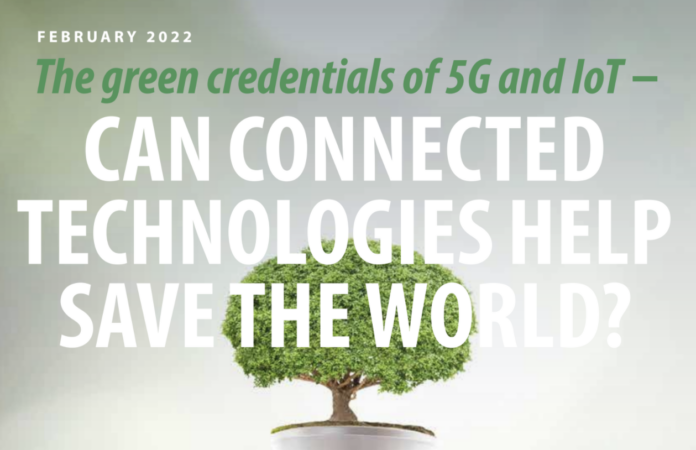Operators can deploy 5G more sustainably than 4G, and use the combo of 5G and IoT to help enterprises become more sustainable
Download the report “The green credentials of 5G and IoT” here.
In many ways, 5G and IoT were made for one another. The latest cellular air interface can support orders of magnitude more devices per square kilometer than its predecessor; in fact, 5G was designed to facilitate broad enterprise digital transformation as a function of massive IoT deployments that turn the physical world into a digital data set.
In a new report co-authored by the staffs of RCR Wireless News and Enterprise IoT Insights, we examine the green credentials of 5G and IoT both as technology sets unto themselves, and as a powerful complementary technologies.
Telecommunications and technology firms the world over are focused on delivering 5G and IoT solutions—as well as a litany of complementary tech like artificial intelligence, machine learning, edge computing, data analytics engines and more—in service of enterprise digital transformation. These enterprises are investing in technology-enabled business outcomes that create new efficiencies, reduce operational costs and open up new revenue-generating opportunities.
Both the buyers and the sellers in this equation are looking to monetize their investments, whether that’s the network, the sensor, the software, the platform, the bundled product, or the end result. While these stakeholders work on implementing and deriving value from execution on technology strategies, they’re also pursuing a separate but very much related goal—sustainability.
The logic around corporate sustainability initiatives has two primary thrusts: first, with increasing urgency around carbon emissions, power consumption and other macro environmental factors, implementing green practices where possible is the right thing to do; second, a more efficient, sustainable business is very likely a more profitable, more valuable business. When you consider those two thrusts in a larger, longer-term context, a more sustainable world with a more predictable future environmental outlook is inherently more stable. And stability is good for business.
Sustainability is “not just about helping yourself”
Discussing the relationship between sustainability and business success, Ericsson North America Chief Technology Officer Mike Murphy pointed out that investors and financial firms now consider sustainability a critical factor in determining the long-term value of a business.
Sustainability is “not just about helping yourself,” he said. “It’s become a business imperative. And so it’s a business imperative in general, and our customers are putting demands on us to support them in this regard. And that’s showing up in RFPs…The whole ecosystem is moving towards a situation where business success demands a strong sustainability program as well.”
For operators, Murphy said it’s possible for operators to break the historic energy curve wherein 5G networks, despite being more dense and supporting more data transmissions, can use less energy than 4G networks. “Practically what that means is network modernization, so upgrade of equipment,” he explained. “Energy-smart operations, meaning how you use it, and looking at different renewable energy sources. But we believe by doing it right, you can actually reduce total energy consumption over time from where we are now.”
From there, the combination of and 5G and IoT can create a virtuous cycle of innovation and sustainable outcomes. “By using 5G the way it was really intended to digitize and automate vertical industries,” Murphy said, “we can further reduce the energy consumption. You see a connection between multiple points here…It’s a happy feedback loop or flywheel.”
This report looks into the sustainability efforts of key 5G companies, including Ericsson, Verizon, Qualcomm and Amazon, as well as taking a deep dive into making the IoT not just massive, but also low-cost and more efficient through sustainable design and production practices.

